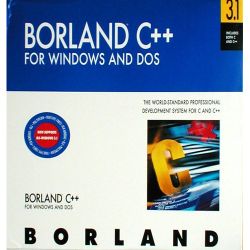Difference between revisions of "Borland C"
From Computer History Wiki
(lame inital version) |
m (Consisten case!) |
||
| Line 18: | Line 18: | ||
With the rise of [[Windows 95]], [[Visual C++]] eventually became the defacto compiler. | With the rise of [[Windows 95]], [[Visual C++]] eventually became the defacto compiler. | ||
| − | [[Category:C | + | {{semi-stub}} |
| − | + | ||
| + | [[Category: C Compilers]] | ||
Latest revision as of 20:00, 18 October 2018
| Borland C++ 3.1 | |
 A retail copy of Borland C++ 3.1 | |
| Type: | Compiler |
|---|---|
| Creator: | Borland |
| Date Released: | 1987 |
Borland started out with Turbo C back in 1987. With version 2.0, it also started to offer a more 'professional' version, Borland C. Turbo C was significantly cheaper than Microsoft C, forcing Microsoft to release a Quick C product to compete for the lower end.
Borland even offered versions for 32bit OS/2, although they were incredibly expensive.
There was support for Windows 3.0 and 3.1, but during the early 32bit days Borland lagged behind, and Watcom C became a popular choice for 32bit MS-DOS based stuff.
With the rise of Windows 95, Visual C++ eventually became the defacto compiler.